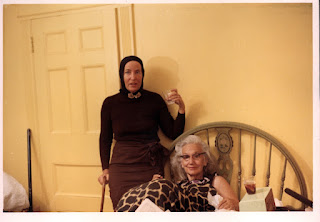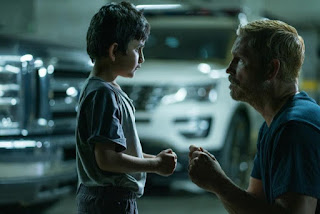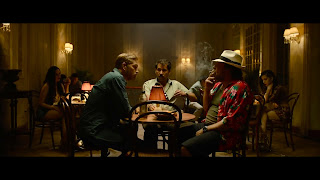GRACE QUIGLEY
When one thinks of Katharine Hepburn's filmography, Grace Quigley is not the first or perhaps even last film that comes to mind. It is an important film in Hepburn's career in that it was the last theatrical film she made where she was the star (Love Affair being more of a glorified cameo). There is a film desperately trying to claw its way out of Grace Quigley, but bad performances and mismatched creatives all around sink it into ending up a poor television movie.
Senior citizen Grace Quigley (Hepburn) is struggling financially, especially with the rent collected by odious landlord Mr. Argo (Harris Laskawy). She wishes people like Mr. Argo would be eliminated. Unexpectedly, her wish is granted when she sees Mr. Argo shot in his car.
Circumstances bring her in contact with the hitman, whom she finds is Seymour Flint (Nick Nolte). She blackmails Seymour into, as she phrases it, giving someone the rub. The person the contract is for is none other than Grace Quigley. Finding life miserable and lonely, she asks that he kill her, negotiating the contract to $1,000. Unfortunately, she could not have found a worse hitman than Flint. It is not that Flint is an incompetent hitman. It's that he's a highly neurotic one, who sees a psychiatrist (Chip Zien) and gets nosebleeds and headaches as a result of his neuroses.
To Flint's horror, Grace now gets other seniors into a package deal. One of them, Harvey Jenkins (William Duell) requests to die quickly but painlessly. His request is granted, albeit accidentally, when Flint's hooker girlfriend Muriel (Kit Le Fever) calls on Jenkins, causing a heart attack. Finding the dispatching of oldsters looking for their final exit a surprisingly lucrative and invigorating business, Seymour and Grace join forces in their newly-formed enterprise, Ultimate Solutions.
Things appear to be going well for everyone. Grace has a new lease on life and Seymour & Muriel get married. Then, Grace meets up with a nasty cabbie who took her shoe. Now she wants to do "pest control", and even a hitman has his limits. Will Grace manage to get Seymour to see things her way? Will both end up in the slammer?
Grace Quigley thinks of itself as a black comedy, but the thing is that it is not funny. Almost everyone involved is visibly wrong for the goings-on in the film.
At the top of the list is Nolte. Grace Quigley may be his worst performance and one of the worst castings in cinematic history. Throughout the film Nolte looks more angry than puzzled or flummoxed by the situations no matter which one Flint is involved with. He spouts his dialogue, never changing his facial expression. Worse, his efforts to be neurotic are cringe-inducing. As he attempts to be flabbergasted by becoming the Angel of Happy Deaths to the old folks at home, Nolte looks irritated by everything and everyone.
It is Nick Nolte, more than anyone else in Grace Quigley, that sinks this project into the awfulness of it all.
Hepburn does herself no favors either. She seems to have an almost perpetual difficulty in playing comedy with some exceptions (The Philadelphia Story, Bringing Up Baby). It is as if Hepburn knows she is too smart for all this, which makes the character Grace Quigley unbelievable.
Take the scene between Grace and Muriel when they first meet. She asks Muriel what she does for a living. After a reluctant beat, Muriel replies, "I turn tricks". Smiling and chuckling slightly, Grace replies, "I used to do tricks myself when I was younger". While it is clear that Grace does not understand what Muriel is saying, one also senses that Hepburn knows that she is too smart to play this dumb. This and other lines are meant to sound funny, but they never come off as funny.
I put things to Hepburn's manner, one where she tries to force the humor but either can't muster the enthusiasm for it or knows it is not funny and makes a stab to fake it until she makes it.
In his small role as the psychiatrist, Chip Zien is barely able to say the words, let alone bring any sense of conviction to them. Only Elizabeth Wilson as Emily Watkins, the woman so determined to be executed that she chased down "Mr. Killer" in a hearse, appears to be invested in the film. Even here though we see how poor Grace Quigley is.
As Flint and Grace involve themselves in a chase to The Pretenders' Bad Boys Get Spanked, there is almost an unhappiness and forced manner to it all. Playing like a bad television movie than a genuine feature film, Hepburn's quip when Emily crashes her car into the river sums up what is wrong with Grace Quigley.
"Looks like Emily has got a freebie," she remarks in a disinterested deadpan manner while Nolte looks on blankly. It is meant to sound funny. It just isn't.
The third person responsible for this debacle is director Anthony Harvey. The British director best known for a previous collaboration with Hepburn, The Lion in Winter, seems to think of 1980s New York as a thoroughly alien world. Amidst the poor, elderly Americans, Harvey seems to barely be acquainted with how they live or are. They do not behave or act like people. Among kings and nobles, Harvey excels. Among working class retirees, Harvey almost thinks of them as unreal.
I do not fault screenwriter A. Martin Zweiback for Grace Quigley's misfire. The subject matter is a bit gruesome to suggest that the elderly lead desperate lives of loneliness and despair for whom suicide is the best answer. Comedy could come from a hitman and an old woman joining forces to help others die happily. However, it was the execution of things that sunk Grace Quigley. So much looked and sounded forced and obvious.
Harvey's direction was listless and dull. The performances, especially from Nick Nolte, were appalling. Grace Quigley is disorganized and unhappy, even for a film about suicides and the hitmen who help them.










_poster.jpg)

